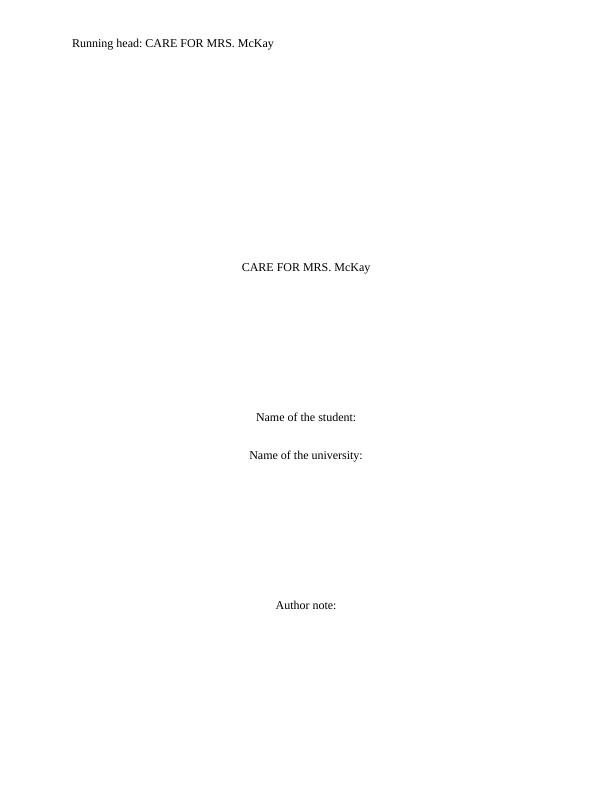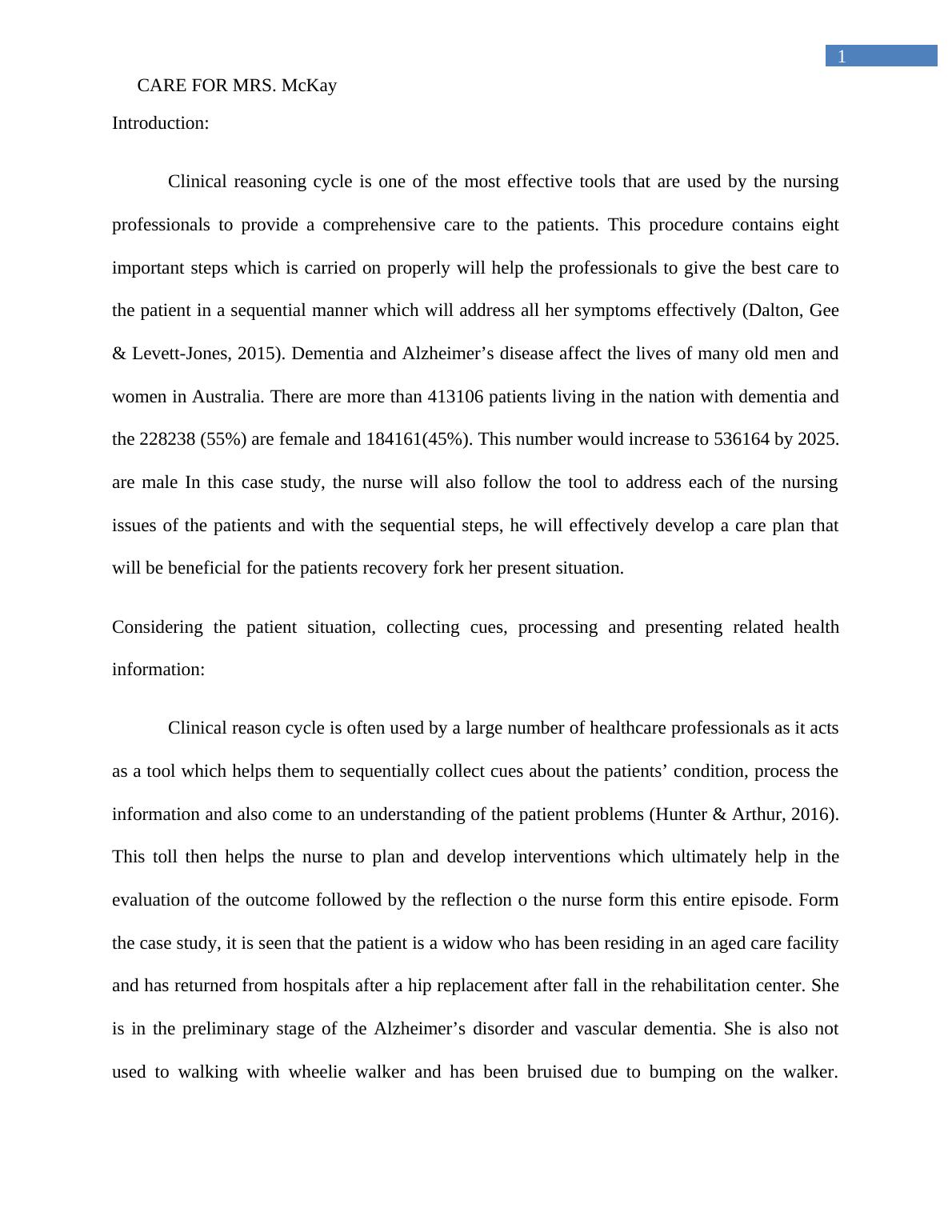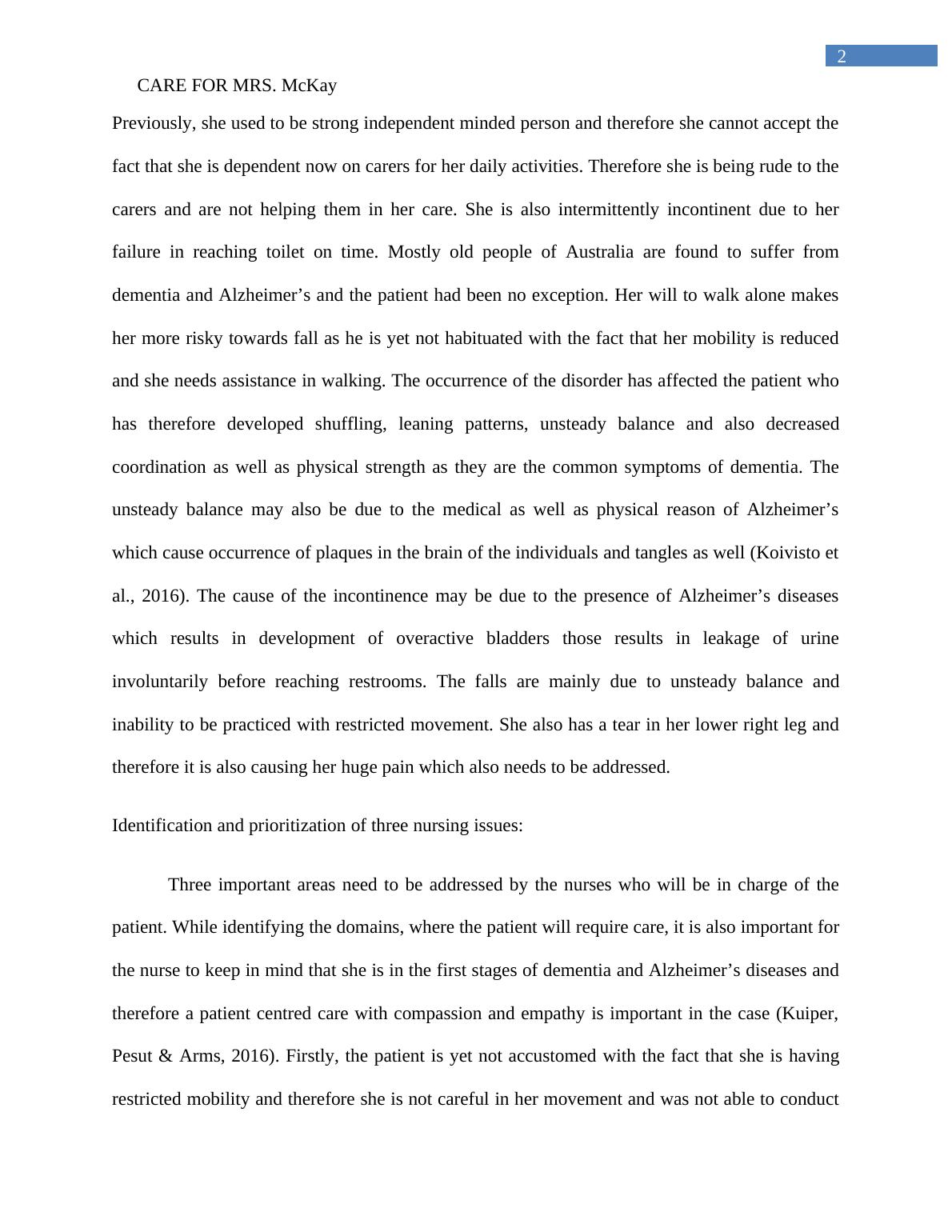NRSG370 Assessment: Case Study – Aged Care
Added on 2020-02-19
10 Pages2745 Words38 Views
Running head: CARE FOR MRS. McKayCARE FOR MRS. McKayName of the student:Name of the university:Author note:

1CARE FOR MRS. McKayIntroduction: Clinical reasoning cycle is one of the most effective tools that are used by the nursingprofessionals to provide a comprehensive care to the patients. This procedure contains eightimportant steps which is carried on properly will help the professionals to give the best care tothe patient in a sequential manner which will address all her symptoms effectively (Dalton, Gee& Levett-Jones, 2015). Dementia and Alzheimer’s disease affect the lives of many old men andwomen in Australia. There are more than 413106 patients living in the nation with dementia andthe 228238 (55%) are female and 184161(45%). This number would increase to 536164 by 2025.are male In this case study, the nurse will also follow the tool to address each of the nursingissues of the patients and with the sequential steps, he will effectively develop a care plan thatwill be beneficial for the patients recovery fork her present situation.Considering the patient situation, collecting cues, processing and presenting related healthinformation: Clinical reason cycle is often used by a large number of healthcare professionals as it actsas a tool which helps them to sequentially collect cues about the patients’ condition, process theinformation and also come to an understanding of the patient problems (Hunter & Arthur, 2016).This toll then helps the nurse to plan and develop interventions which ultimately help in theevaluation of the outcome followed by the reflection o the nurse form this entire episode. Formthe case study, it is seen that the patient is a widow who has been residing in an aged care facilityand has returned from hospitals after a hip replacement after fall in the rehabilitation center. Sheis in the preliminary stage of the Alzheimer’s disorder and vascular dementia. She is also notused to walking with wheelie walker and has been bruised due to bumping on the walker.

2CARE FOR MRS. McKayPreviously, she used to be strong independent minded person and therefore she cannot accept thefact that she is dependent now on carers for her daily activities. Therefore she is being rude to thecarers and are not helping them in her care. She is also intermittently incontinent due to herfailure in reaching toilet on time. Mostly old people of Australia are found to suffer fromdementia and Alzheimer’s and the patient had been no exception. Her will to walk alone makesher more risky towards fall as he is yet not habituated with the fact that her mobility is reducedand she needs assistance in walking. The occurrence of the disorder has affected the patient whohas therefore developed shuffling, leaning patterns, unsteady balance and also decreasedcoordination as well as physical strength as they are the common symptoms of dementia. Theunsteady balance may also be due to the medical as well as physical reason of Alzheimer’swhich cause occurrence of plaques in the brain of the individuals and tangles as well (Koivisto etal., 2016). The cause of the incontinence may be due to the presence of Alzheimer’s diseaseswhich results in development of overactive bladders those results in leakage of urineinvoluntarily before reaching restrooms. The falls are mainly due to unsteady balance andinability to be practiced with restricted movement. She also has a tear in her lower right leg andtherefore it is also causing her huge pain which also needs to be addressed.Identification and prioritization of three nursing issues: Three important areas need to be addressed by the nurses who will be in charge of thepatient. While identifying the domains, where the patient will require care, it is also important forthe nurse to keep in mind that she is in the first stages of dementia and Alzheimer’s diseases andtherefore a patient centred care with compassion and empathy is important in the case (Kuiper,Pesut & Arms, 2016). Firstly, the patient is yet not accustomed with the fact that she is havingrestricted mobility and therefore she is not careful in her movement and was not able to conduct

End of preview
Want to access all the pages? Upload your documents or become a member.
Related Documents
Clinical Reasoning Cycle Case Study for Nursing Professionalslg...
|10
|2625
|95
Nursing Assignment Vascular Dementialg...
|8
|2122
|148
Nursing Care Plan Essaylg...
|16
|3201
|147
Nursing Assignment - Dementia Carelg...
|12
|3435
|414
Critical Reflection on Practice: Mental Health Wellbeing and Dementialg...
|5
|1606
|153
Nursing Care Plan 3 Clinical Placement Case Study 2022lg...
|11
|1740
|24
